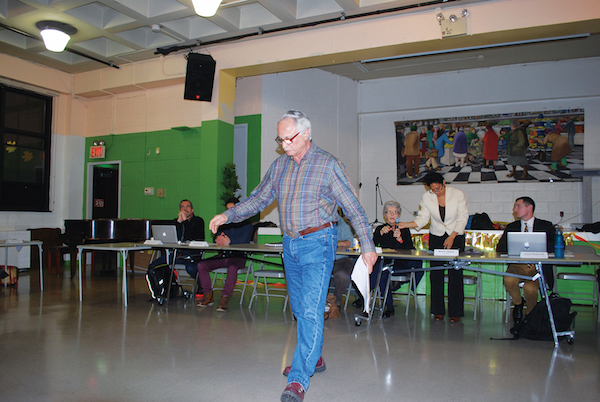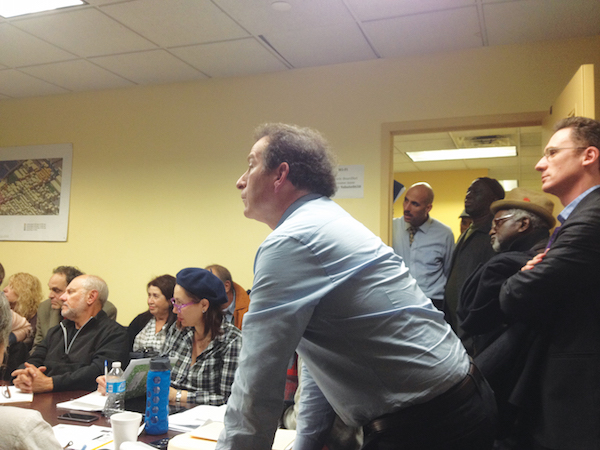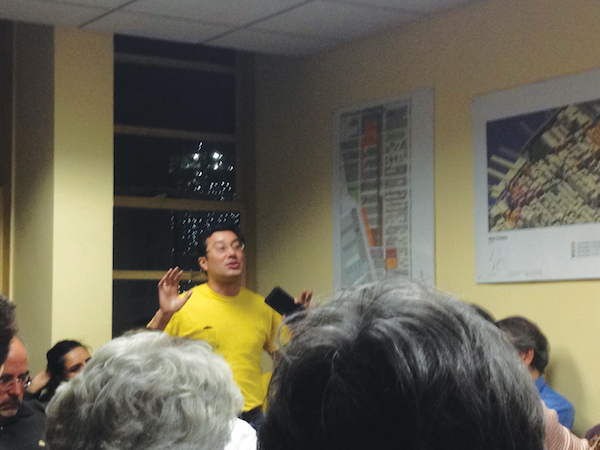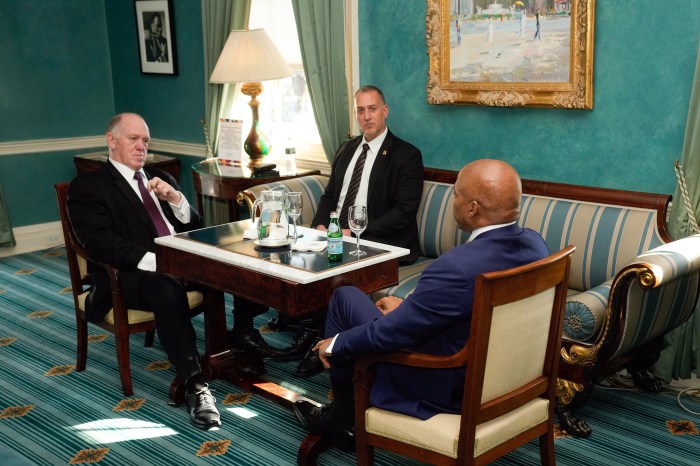
BY SEAN EGAN | It was a tale of two sides, told twice — as separate gatherings of Community Board 4 (CB4) heard testimonial from vendors and ownership associated with the permit-seeking Hell’s Kitchen Flea Market (HKFM). The open-air event, held weekends at W. 39th St. and Ninth Ave., has been the subject of controversy recently. At Dec. 7’s CB4 Quality of Life (QOL) subcommittee, the Market’s 2016 Street Activity Permit Office (SAPO) permit renewal was the subject of extensive debate.
The meeting followed Dec. 2’s CB4 full board meeting, at which several vendors spoke about the abuse they’ve received while working at HKFM, at the hands of owner Alan Boss and his wife Helene Boss.
Anthony DeVincenzo, a 10-year vendor, spoke of a movement to change up the management. “There is animosity among parties,” he said, “and vendors would like to see the market get its old vitality back.”
Mik Farkas, another vendor, said many are “fearful to speak up and lose what they have,” and claimed the market is no longer vital and that “it’s being milked for [the Bosses’] personal purposes. The character of the folks running the market is horrendous. I can’t believe some of the things I’ve heard with my own ears,” he said. He was supported by another vendor, David Bros, who relocated his business in response to the allegedly degrading treatment by Alan and Helene Boss. Another former vendor, April Summers, accused Helene Boss of harassing her and her 12-year-old daughter after she was late with rent, including cursing at the child.
Bad blood between Market vendors and the ownership was addressed in a Dec. 6 New York Post article, which also quoted Bros — who, along with others, detailed his grievances and articulated allegations against Alan and Helene Boss.
The Dec. 7 QOL meeting, however, had a slightly different tenor. Held at CB4’s relatively small W. 42nd St. office space, an overflow crowd spilled out of the meeting room and well into the vestibule. Representatives from SAPO — which is responsible for permitting on-street events such as farmers markets, block parties, and street festivals — were on hand to deliver a presentation about their department at the top of the meeting.
SAPO requires a nonprofit to sponsor an event in order to grant a permit. Even more relevant to the meeting, however, was the information that community boards can comment on applicants. If denied or given stipulations by the board, SAPO would honor their decision.
Following the SAPO presentation, the stage was set for HKFM representative Scott Isebrand, who delivered a presentation pleading the Market’s case for their permit renewal. He highlighted Alan Boss’ longtime association with flea markets, including his famous Sixth Ave. one, which, after being established in 1976, became a notable location for the community, tourists, and luminaries like Andy Warhol.
The W. 39th St. location in question was opened in 2003, and according to the presentation, achieved profitability in 2011. Isebrand also attempted to contextualize the decline of the Market, citing factors such as changing tastes, the rise of online shopping, and weather as having a sizable impact on business — thus accounting for the dwindling customer and vendor base that critics have been citing.
He also documented the creation of the Hell’s Kitchen Foundation — the nonprofit organization founded by Boss and his associates in 2012 to sponsor the Flea Market, in accordance with SAPO. According to a statement from a publicist for Boss, it was “created to foster the arts by providing financial support to local artists as they pursue their passion,” and it plans to give out grants to artists starting next year. However, the IRS did not approve the nonprofit until February 2015.
The members of the QOL committee, who had extensive questions for the applicant, expected Boss and co. to provide them with far more detailed plans for the future, as well as in-depth financial documentation pertaining to the running of the Market and the nonprofit.
QOL Co-Chair David Pincus criticized Boss and Isebrand’s plans and presentation as being “highly amorphous.” Both he and Co-Chair Tina DeFeliciatonio were wary of claims that Boss was “certainly receptive to the stips” because he wanted to “build the market up to what it was,” when it was clear the HKFM was not abiding by all the stipulations currently in effect — including not having the required security, or a full time manager (their current one splits his time between their two flea market locations).

Furthermore, noting that the presentation stated that the Market achieved profitability in 2011, and that the Hell’s Kitchen Foundation was established in 2012, the board demanded to know why the foundation has not been making donations yet. Boss asserted he wanted to wait for IRS authentication before doing so — but that during the three-year interim, while still operating HKFM (using a temporary IRS EIN), he and the Market simply made charitable donations independently, and that the Market supported other nonprofits, including by giving them free space at the HKFM. The board was in agreement that they needed to see the Foundation and HKFM’s books to verify these claims, which Boss agreed to provide.
The board was also troubled to find out from Boss that the Foundation had been operating without a board of directors to determine how grants would be dispersed — a claim later refuted by a press rep of Boss’ stating that there was indeed a board of directors, but that the Foundation was looking for a selection committee with expertise in the arts to award grants.
To ameliorate the situation, the board and Boss agreed that it would be appropriate to retroactively direct 25 percent of profits from the interim years to the foundation, to be used for the grants.
Later, when confronted by the board about the recent allegations of abuse of and discontent amongst vendors, Boss, stating that a minority of vendors felt wronged, paraphrased Abraham Lincoln, saying, “You can’t make all of the people happy all of the time.”
“Do you recognize,” pushed Pincus, “there is a problem that needs work?”
“I recognize there is a problem from some people,” Boss replied, saying he’d do his best to improve relations “short of hiring Sigmund Freud.” Other suggestions presented by Boss for improvement included reducing the current $90 rate for a 10×10 table (despite it being the lowest figure around), in order to attract more and varied merchants.
Following the board’s inquiry, the room was open to public comment. One of the first to speak was a representative from Hyde Park, a parking garage whose business has been detrimentally affected by the Market, due to the restricted flow of traffic, who advocated for stipulations to be enacted to help improve his business when the Market was running.
Also present, and speaking against the Bosses again were David Bros and Mik Farkas, clad in yellow shirts from the Street Vendor Project (SVP). Also present was lawyer Sean Basinski of the Urban Justice Center (the firm behind the SVP), who, as during the CB4 Full Board meeting, spoke against the Bosses’ practices, suggesting it might be time for a new manager of the market.

Despite this, though, the attitude in the room was overwhelmingly positive, and more than a dozen longtime Flea Market vendors came out to show their support — a good number of which had worked with Boss for decades, and followed him to the various locations at which his markets have taken place. There were numerous heartfelt pleas to keep the market going, and people testifying to the mettle of Boss’ character as a fair and friendly owner throughout the years. Their consensus was that though the Market wasn’t perfect, it was still a vital part of the community.
“It’s my little business,” Geisha Otera, a vendor for nine years, said of her space at the market. “It’s really my means of income, and I don’t want that taken away from me.”
Dawn, a vendor for six years, had no qualms with management, saying they’ve been “out of their way nice and professional” and calling the Market a “cultural stronghold.”
One vendor, Peter Farkas (no relation to Mik), went so far as to recriminate Bros, claiming he frequently got into arguments with neighbors.
Helene Boss also spoke up in defense of herself, calling the Post “a rag” that published “unsubstantiated, untrue allegations.” While acknowledging that she is tough, she insisted, “I run a clean operation,” and had a vested interest in “protecting my vendors.”
In the end, the QOL committee saw the Market as an amenity for the community they did not want to risk losing, and passed a motion to draft a letter — with new and updated stipulations — approving Boss and the Market to SAPO.
The letter would take the form of a “Deny Unless,” making the enforcement of the stipulations more stringent — with the QOL committee suggesting checking up on a monthly basis to ensure the stipulations are actually being followed, and reserving the right to withdraw approval.
Stipulations included finding a full-time manager devoted only to the W. 39th St. market location, and increasing security detail once the market exceeded 50 vendors. It was also contingent on Boss and co. providing the board with financial statements by the afternoon of Wed. Dec. 9, which would verify the charitable activities and use of funds he claimed throughout the meeting.
Time is quickly becoming scarce to sort this issue out, however, as the deadline for SAPO approval is Tues., Dec. 15.
Additional reporting for this article was provided by Winnie McCroy.





































